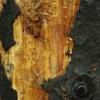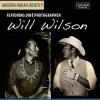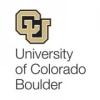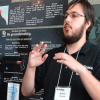Science & Technology
 <p>Awake too early when you should be asleep? Might want to try and switch things up. A new study by the University of Colorado shows that the longer people are awake during the time their biological clock is telling them to sleep the worse their sensitivity to insulin, which is a precursor to diabetes.</p>
<p>Awake too early when you should be asleep? Might want to try and switch things up. A new study by the University of Colorado shows that the longer people are awake during the time their biological clock is telling them to sleep the worse their sensitivity to insulin, which is a precursor to diabetes.</p> <p>On the heels of its most successful and well-received season to date, the Colorado Shakespeare Festival announced its 2016 season, which will run Friday, June 3 through Sunday, Aug. 7, 2016. Opening with Shakespeare’s farcical "The Comedy of Errors," the festival’s 10-week season also includes the regional premiere of Bill Cain’s "Equivocation," along with "Troilus and Cressida," "Cymbeline" and "Henry VI, Part 2." Season tickets are now on sale; single tickets go on sale Monday, Nov. 30.</p>
<p>On the heels of its most successful and well-received season to date, the Colorado Shakespeare Festival announced its 2016 season, which will run Friday, June 3 through Sunday, Aug. 7, 2016. Opening with Shakespeare’s farcical "The Comedy of Errors," the festival’s 10-week season also includes the regional premiere of Bill Cain’s "Equivocation," along with "Troilus and Cressida," "Cymbeline" and "Henry VI, Part 2." Season tickets are now on sale; single tickets go on sale Monday, Nov. 30.</p> <p><span>A collaborative effort involving six counties, the University of Colorado Boulder and the nonprofit aerospace advocacy group, UAS Colorado, has paved the way for the launch and testing of two unmanned aircraft systems (UAS) in the San Luis Valley. </span></p>
<p><span>A collaborative effort involving six counties, the University of Colorado Boulder and the nonprofit aerospace advocacy group, UAS Colorado, has paved the way for the launch and testing of two unmanned aircraft systems (UAS) in the San Luis Valley. </span></p> <p>Contrary to expectations that spruce beetle infestations increase the severity of wildfires in southwestern Colorado, a new study led by University of Colorado Boulder researchers has found that this native insect may not be to blame after all.</p>
<p>Contrary to expectations that spruce beetle infestations increase the severity of wildfires in southwestern Colorado, a new study led by University of Colorado Boulder researchers has found that this native insect may not be to blame after all.</p> <p><span>On Thursday, Oct. 29, </span><span>at 4 p.m. in UMC 235,</span><span> Institute of Arctic and Alpine Research Fellow and Professor of civil, environmental and architectural engineering Diane McKnight will present, “The McMurdo Dry Valleys, Antarctica: Ecosystems waiting for water” as part of the 2015 Distinguished Research Lecturer series.</span></p>
<p><span>On Thursday, Oct. 29, </span><span>at 4 p.m. in UMC 235,</span><span> Institute of Arctic and Alpine Research Fellow and Professor of civil, environmental and architectural engineering Diane McKnight will present, “The McMurdo Dry Valleys, Antarctica: Ecosystems waiting for water” as part of the 2015 Distinguished Research Lecturer series.</span></p> <p>Researchers from the U.S. Geological Survey and key academic partners including the University of Colorado Boulder have quantified how rapidly ancient permafrost decomposes upon thawing and how much carbon dioxide is produced in the process.</p>
<p>Researchers from the U.S. Geological Survey and key academic partners including the University of Colorado Boulder have quantified how rapidly ancient permafrost decomposes upon thawing and how much carbon dioxide is produced in the process.</p> <p>CU-Boulder’s Center of the American West presents Diné photographer Will Wilson as the twelfth speaker in the Modern Indian Identity lecture series. Willson will speak on Monday, Oct. 26, at 6:30 p.m., in Hale, room 270.</p>
<p>CU-Boulder’s Center of the American West presents Diné photographer Will Wilson as the twelfth speaker in the Modern Indian Identity lecture series. Willson will speak on Monday, Oct. 26, at 6:30 p.m., in Hale, room 270.</p> <p>Launched in May 2014 to jumpstart projects led by current CU-Boulder students, faculty and staff, the CU-Boulder Crowdfunding platform hosted 19 projects raising over $80,000 in the first year. </p>
<p>Launched in May 2014 to jumpstart projects led by current CU-Boulder students, faculty and staff, the CU-Boulder Crowdfunding platform hosted 19 projects raising over $80,000 in the first year. </p>- <p>SuviCa Inc. of Boulder, a University of Colorado Boulder biotech start-up company, has been awarded roughly $1.5 million in federal funding to develop novel treatments for head and neck cancer.</p>
 <p dir="ltr">When he was in high school, Daniel Pette was fascinated by stars. When his earth science teacher told him that massive stars die out faster than smaller ones, Pette diagrammed a theory to figure out why this was. When he discovered that his findings were correct, Pette became determined to pursue a career in astrophysics. </p>
<p dir="ltr">When he was in high school, Daniel Pette was fascinated by stars. When his earth science teacher told him that massive stars die out faster than smaller ones, Pette diagrammed a theory to figure out why this was. When he discovered that his findings were correct, Pette became determined to pursue a career in astrophysics. </p>


